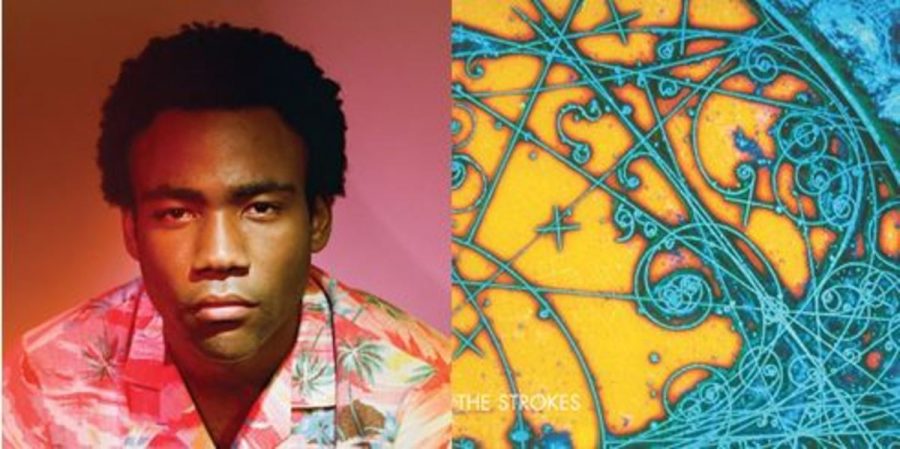By Siddharth Jejurikar ’16, Entertainment Editor
Confused and disconnected, many people walk the earth with no sense of the world around them. Childish Gambino’s Because the Internet and The Strokes Is This It, two albums a dozen years and a genre apart, share a foundational thematic basis, painting a character portrait of lost, shallow youth, moving from day to day surrounded by superficiality, conformity, vanity, and lack of meaning. Struggling to maintain even the slightest passing resemblance to real connections, the relationships held by these characters are simple constructs with no emotional connection or intent. This façade of humanity is the mask we all wear, and the albums serve as warnings of the consequences of a prevailing attitude of meaninglessness. While Childish Gambino creates a distinct character who serves as a microcosm of the people growing up in the internet generation, The Strokes provide a collection of musings, thoughts, and lessons of people far too conscious of their mistakes to still be making them. Childish Gambino’s accompanying screenplay proves his commitment to his character as a representation of the age. Losing emotional attachment to everything around him, his character barely reacts when he learns of his father’s death and accepts reality as he always does with the same bored demeanor. Julian Casablancas, front man for The Strokes, took cues from his own environment—writing his lyrics to detail the lives of New York’s youth. In the end, the result is the same: a sweeping statement about the truth of the world and its denizens: the people far too ignorant to make lasting connections with people, be individuals, and understand the importance of the world around them.
The way human beings interact with one another is a major determining factor in our outlook on the world. The less our relationships actually matter to us, the less we have holding us to reality. On “Telegraph Avenue”, Gambino’s character’s fear of commitment surfaces as he says, “And I’m nervous, truth be told/ I never saw me growing old/ In Oakland, in Oakland/ And if I married you tonight/ It would probably start a riot/ In Oakland, in Oakland.” Making excuses for his apprehension, he blames Oakland rather than himself, choosing to remain where he is instead of moving on and developing his life. In “Someday”, The Strokes explore a similar concept, “You say you wanna stay by my side/ Darlin’ your head’s not right/ See alone we stand, together we fall apart/ Yeah I think I’ll be alright,” constantly taking the easy way out, the narrator abandons goals worth pursuing for fear of finding love. Completely detached from reality, anxiety and dread of change keeps the status quo and stifles progress for both persons. A sense of false love prevails over the desire for true connections in both the artist’s works. The Stroke’s title track “Is This It” kicks the album off with distinct themes of bored interactions and pointless one-night stands. The fallacy of human company that Is This It’s narrators trick themselves into is shared with Gambino’s singular character, as he surrounds himself with friends that only exist because of his money. In “3005” the character’s confusion surfaces, “And no matter where all of my friends go, Emily, Fam, and Lorenzo/ All of them people my kinfolk, at least I think so, can’t tell/ Cause when them checks clear, they’re not here.” In The Stroke’s “Soma” the same need for acceptance that surrounds Because the Internet’s narrator drives people to addiction. Named after Aldous Huxley’s fiction drug, the song explores the cycle involved with trying to end substance addiction, with peer pressure and excuses pushing down on progress.
People often follow their mistakes with personal reflection, but is reflection always the cure to human fallibility? The Strokes answer in the negative with their track “Barely Legal”. The narrator of this track is a much older person attempting to teach his significantly younger girlfriend life lessons that he’s learned. His lessons are filled with contradictions and confusions. “I should have worked much harder/ I should have just not bothered,” says the man—with a clear paradox in his statements. “These little problems, they’re not yours they’re mine,” he admits, realizing the fact that he himself has never learned from his past, as evidenced by the situation he is in: a loveless and ultimately pointless relationship (“Oh you ain’t never had nothin’ I wanted but/ I wanted love, I just can’t figure out/ nothin”). Gambino leaves the issue with dubious hope for an end as well with the track “no exit”. In the song, the boy enters a midnight crusade for self-realization. Though, like the man in “Barely Legal”, he knows he’s made many mistakes, he still fails to correct them. “Man is a star bound to a body inside of me,” Gambino’s distorted voice speaks over darkly toned instrumentals, possibly a metaphorical statement about the character feeling trapped in himself—hiding his real personality. This understanding does nothing as, in the first verse of the song, all he can think about is when a girl will text him back.
Let these records, despite their major stylistic and musical differences, stand as a singular monolith of symbolic significance. Prophets of your possible future and cautionary tales of a youthful capacity to lose sense of reality, the narrators of these albums should jerk you awake, lift you from your seat, revitalize the energy in your heart, and make you learn to love again. Have meaningful friendships, learn from your mistakes, and never conform. Fail and you may end up just as lost and confused as the characters Childish Gambino and The Strokes so meaningfully portray are.






